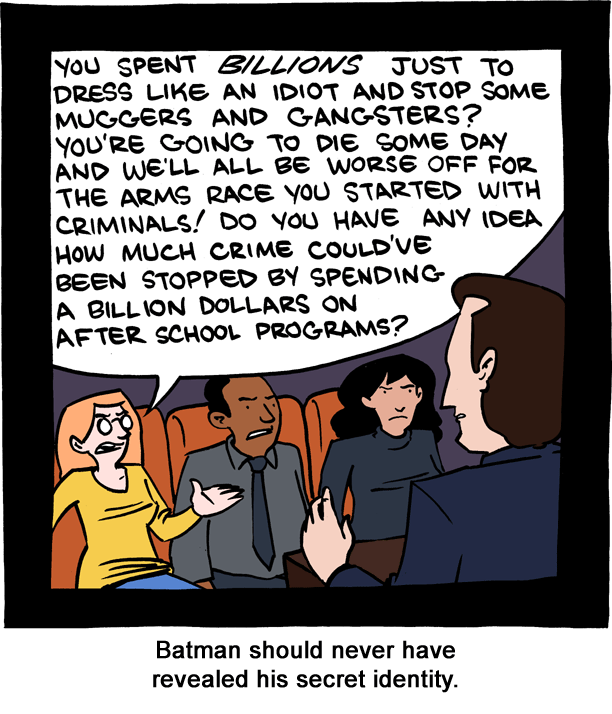

Photo source: Wikipedia.
27 February 2013
Do you want to buy a firearm for protection? Many people do because of the high rate of violent crime in South Africa. But is it sensible? Will a gun make you more secure or will it put you and your loved ones in greater danger?
When it comes to crime, perception is often out of kilter with reality. Many people believe South Africa is becoming more dangerous or that it is just as dangerous as it was ten or 15 years ago. Yet, according to SAPS, serious crime has declined from over 5,000 incidents per 100,000 people in 2003 to about 3,600 in 2011.1 Homicides have declined from over 21,500 in 2000 to less than 17,000 in 2009.2 This is still very high; murder accounts for about 3% of deaths and there are even more murders than the large number of road deaths.3 South Africa is a dangerous place.
Your risk of being murdered is vastly different depending on where you live. Sea Point Police Station reported 37 murders from April 2003 to March 2012. In the same period, Nyanga Police Station reported nearly 2,300 murders, the highest of any police station in the country.4 There is a strong link between living in a poor neighbourhood and the risk of being murdered.
As with the perception that crime is getting worse in South Africa, the perception that having a firearm will make you safer is not supported by evidence. In 2000, the Firearms Control Act was passed, making it harder to buy a firearm. Since then, the rate of firearm ownership has declined. Gun Free South Africa estimates that gun ownership has dropped from about 13 per 100 people in 1998 to less than 6.5 This appears to be a good thing because along with the drop in the number of homicides there has been a drop in the number of homicides caused by firearms, from over 11,000 in 1999 to fewer than 8,500 in 2007.6 Now correlation does not imply cause, but it does suggest it. We can’t be sure that the decline in homicides and gun-related homicides in particular is due to lower gun ownership but it is plausible that it is.
Data from the United States offers compelling evidence that buying a gun is more likely to cause tragedy than prevent it. Using police and medical records, researchers reviewed all shootings in three US cities over a year. Their key finding is sobering for potential and current gun owners, “For every time a gun in the home was used in a self-defense or legally justifiable shooting, there were four unintentional shootings, seven criminal assaults or homicides, and eleven attempted or completed suicides.”
Here are some more disturbing facts from the US, all quoted from a recent article published in Mother Jones.7:
In 2011, nearly ten times more people were shot and killed in arguments than by civilians trying to stop a crime.
A study in Philadelphia found that an assault victim was 4.5 times likelier to get shot if he carried a gun. His odds of being killed were 4.2 times greater.
In a survey, nearly 1% of Americans reported using guns to defend themselves or their property. However, a closer look at their claims found that more than half involved using guns in an aggressive manner, such as escalating an argument.
A woman’s chances of being killed by her abuser increase more than seven times if he has access to a gun.
In Australia a gun buyback programme, introduced by the conservative John Howard government in response to a mass-shooting in Tasmania in 1996, nearly halved the number of gun-owning households. An analysis found that this resulted in a significant drop in suicides and homicides, with the firearm suicide rate dropping by 80%.8
When I tweeted some of these facts a few days ago, one person, who describes himself as “anti-statist”, tweeted back, “So the inference is the criminality, misfortune & stupidity of others should restrict the rights of others?”
Putting aside that I did not explicitly advocate for gun control, I have these questions for the anti-statist tweeter, or to anyone who believes they are responsible enough to own a hand gun for protection:
Are you sure having a gun will not tempt you into criminal behaviour or that you will not do something stupid with your gun that results in someone being tragically and innocently hurt?
Are you sure you will never, in anger or fear, use your gun irresponsibly?
I imagine that before Oscar Pistorius shot dead Reeva Steenkamp on Valentine’s Day he would have proclaimed himself a “responsible” gun owner and answered yes to these questions.
 With permission of Zach Wiener. Please note that this cartoon is not under GroundUp’s Creative Commons license
With permission of Zach Wiener. Please note that this cartoon is not under GroundUp’s Creative Commons license
SAPS. 2012. Crime Statistics Overview RSA. http://www.saps.gov.za/statistics/reports/crimestats/2012/downloads/crim…↩
UNODC. 2011. ‘Homicide in 207 Countries - South Africa.’ Global Study on Homicide 2011: Trends, Context, Data; Statistical Annex (with online datasets), pp. 103-125. Vienna: United Nations Office on Drugs and Crime. 6 October. Cited in GunPolicy.org, South Africa — Gun Facts, Figures and the Law. http://www.gunpolicy.org/firearms/region/south-africa ↩
Stats SA. Mortality and causes of death in South Africa, 2009: Findings from death notification. http://www.statssa.gov.za/publications/P03093/P030932008.pdf (Note the 3% figure I have cited is calculated by dividing the number of homicides into total deaths.) ↩
SAPS homicide statistics by police station are available here: http://www.saps.gov.za/statistics/reports/crimestats/2012/province.htm ↩
See the Fast Facts section on the front page of Gun Free South Africa’s website: http://www.gca.org.za/ ↩
UNODC. Homicide Statistics. http://www.unodc.org/unodc/en/data-and-analysis/homicide.html ↩
Gilson, D. 2013. 10 Pro-Gun Myths, Shot Down. http://www.motherjones.com/politics/2013/01/pro-gun-myths-fact-check ↩
Leigh, A. et al. Do Gun Buybacks Save Lives? Evidence from Panel Data. American Law and Economics Review. doi: 10.1093/aler/ahq013. http://andrewleigh.org/pdf/GunBuyback_Panel.pdf ↩